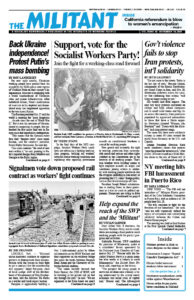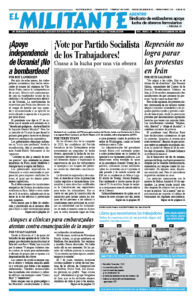“Do not come to the streets. Today is the last day of riots,” Hossein Salami, commander of the Islamic Revolutionary Guard Corps in Iran, said Oct. 29, threatening protesters across the country that continuing their actions “will bring no happy ending to you.”
His threats had little impact. The next day daily protests continued on college and high school campuses and in small rural towns and big cities across the country, from provinces populated by oppressed nationalities to those that have a Shiite majority. Protesters chanted “Women, life, freedom!” and “Down with the dictator!” and sang protest songs.
The same day there were solidarity actions in some 30 cities around the world from Germany to the U.S. and Canada.
Iranian President Ebrahim Raisi made slanderous claims that protests “pave the ground for terrorist acts,” after an Oct. 26 terror assault on a Shiite Muslim shrine in the city of Shiraz left 14 dead. The Islamic State took credit for the massacre.
Over the course of the following weekend, thugs from the Basij, a paramilitary force run by the Revolutionary Guard, stepped up their attacks on demonstrators. In some cases they fired live ammunition. But the protest movement continues.
Protests began after the Sept. 16 death of Mahsa Amini. The young Kurdish woman died three days after she collapsed following her arrest by the “morality” police in Tehran for allegedly not hewing to the reactionary regime’s dress code. Few believe the official story that the police did not beat her.
Her death unleashed pent-up anger at the bourgeois clerical regime’s trampling on basic democratic rights and the oppression of women, as well as discrimination against oppressed nationalities and religious minorities. The protests also reflect deep opposition to the deadly toll of the regime’s military adventures throughout the Middle East.
Amini’s real first name is not Mahsa, but Jina — which means “life” in Kurdish. But to be legally recognized, names in Iran have to be approved by the Supreme Council of Registry. Because the council routinely rejects names it views as encouraging Kurdish national identification, many Kurdish families give their newborns two names, one for official registration and one for family and friends.
Oppression of the Kurds
Thirty million Kurdish people live in Turkey, Iraq, Iran, Armenia and Syria — the largest nationality in the world without its own country. In Iran, like elsewhere, they face discrimination in jobs, housing and the use of their language in school. Nearly half of Iran’s political prisoners are Kurdish. The regime’s rulers have been bombing camps of Iranian Kurds across the border in Iraq.
Thousands turned out for the 40-day mourning ceremony in Amini’s hometown of Saqqez in the Kurdish region of Iran Oct. 26. This was despite the government blockading roads leading to the cemetery, and its claims that the family didn’t want the event.
An article published by the government-funded Iranian Students’ News Agency reflects the depth of the growing movement. “People have become distrustful of many things and do not believe the words of the official media,” the reporter wrote. “I did not expect such a large crowd,” which he estimated at 10,000 strong.
The reporter noted that along with the slogan “Women, life, freedom!” there were also chants in support of Kurdish rights. Some youth raised the Kurdish flag.
“I had come to Kurdistan before,” the reporter wrote, “but today I saw a new attitude among the people.”
The ongoing nationwide protests show that the “new attitude” is not just among the oppressed Kurdish, Azerbaijani, Arab and Baluch peoples.
The government has been stepping up its actions against the protests. On Oct. 31 the chief justice of Tehran announced that public trials for 1,000 of those arrested in the capital will begin this week. Thousands more have been arrested across the country, including students, workers and journalists. Rap musician Toomaj Salehi is one of them. He recorded a song supporting the freedom fight.
Basij thugs and student protesters clashed at Tehran University Oct. 31. When the Revolutionary Guard surrounded the university blocking the protesters from leaving, parents and family members rushed to the campus to prevent more violence.
In an Oct. 30 statement, the Organizing Council of Oil Contract Workers announced it was temporarily postponing a nationwide strike set to begin Oct. 29, called to demand the release of all political and union prisoners. “A large number” of union members had been arrested, the union said, and they need time to allow for “more preparations.” The union said, “We declare again that the workers will not remain silent. The oil workers ourselves are part of the same people who are protesting against poverty, the oppression of women and to have a decent life.”

